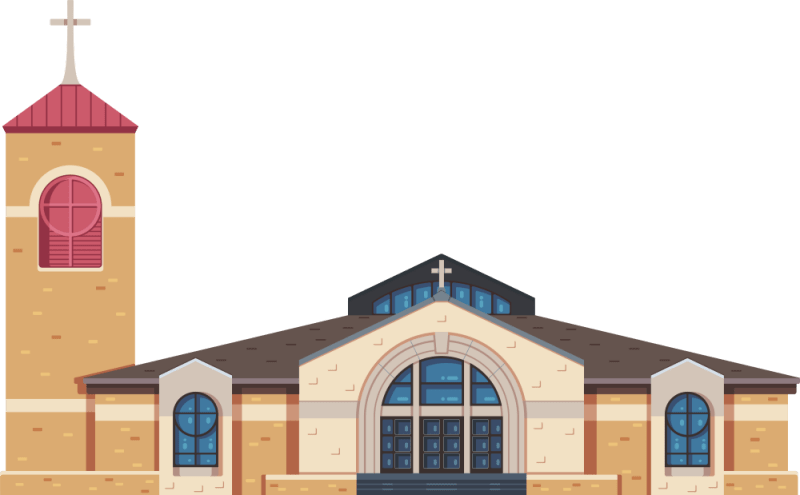"A man in trouble longs for the feeling — at which men may easily scoff, but which is nevertheless a most real and helpful feeling — that he is upheld by the prayers of those that love him...Even the Lord Jesus wanted sympathy, and the uplifting of others' prayers for him, when he was in the agony of Gethsemane." — R. Tuck.
Who among us cannot understand the significance and meaning the prayers of others can have when we ask others to pray for us? Think of the most recent example of Fr. Lamb's brother-in-law, who testified to the feeling of calmness and peace he experienced the morning of his surgery, something he himself attributed to as being a result of all the prayers everyone offered up for him.
In a world that can get as dark as ours, perhaps we make sure we don't underestimate the value prayer-resultant peace and support will have to those who are beset by the anxieties of their lives. And perhaps we do this by embracing the idea that intercessory prayer isn't just something nice we can or should do when we have the time but rather something more of a non-negotiable responsibility we have towards our brothers and sisters in Christ. 1 Samuel 12:23 comes to mind: "...far be it from me that I should sin against the LORD by failing to pray for you."
What about here though—surely it isn't absolutely necessary to use this website to pray. Of course it isn't, BUT...let me ask you this:
Might there be a difference between wondering whether or not there could be some unknown number of people out there who could be praying for you, and knowing beyond the shadow of a doubt—with proof—that there is a definite and certain number of people who are not only praying for you but also taking the time to let you know they're offering prayers for you?
In a society where we are fortunate enough to have the ability via technology to let others—strangers and friends alike—know that we care...nay, where we have the ability to show them we care...what might our responsibility be morally, practically, and spiritually to do just that?
We know the power that online likes and views can have. It's tragic yet true for better or for worse that the amount of people who do or do not engage with whatever someone posts on the internet can have an effect on their mental well-being. Can't we harness that though by using technology to show others we care and positively impact their spiritual well-being by showing them we're praying for them?
Lest we carelessly yet inadvertently forget this though, it's necessary that we also realize the effects of our prayers for others aren't limited to helping them internally. As notable theologian C.H. Spurgeon has famously proclaimed:
"Prayer moves the arm that moves the world. Just as Elijah's prayers directed the rain, your prayers—if you are in Christ—direct the world. Yes, God is sovereign and can do what he will without us, but he chooses to use our prayers."
Do you know who knew this well? The Apostle Paul. Think of Romans 15:30, where Paul asks for the Romans to pray for him to help advance the gospel. Note that he doesn't ask the Romans to beg the assistance of their senate or emperor to help him accomplish his goals--and surely he could have asked for this type of support--but he doesn't. Instead he asks them to pray to God for him and he does so because he knows our pleading hearts that ask of God's assistance are much more powerful than the working of our hands. This is to say nothing of the many other examples of Paul asking for others to pray for him.
One more example. In Exodus 17, we recall the story of how Moses stood atop a hill overlooking a battle between the Joshua and the Israelites and the Amalekites:
"As long as Moses held up his hands, Israel prevailed; but when he lowered them, Amalek prevailed. When Moses’ hands grew heavy, they took a stone and put it under him, and he sat on it. Then Aaron and Hur held his hands up, one on each side, so that his hands remained steady until the sun went down. So Joshua overwhelmed Amalek and his army with the sword."
Is it not our responsibility to help others lift their prayers to God by giving them whatever support we can? And might we not think of this site as the stone on which people can sit and our efforts in praying with them and showing them we're praying with them as analagous to the support Aaron and Hur offered?
As Harold Martin has said: "The eye cannot say unto the hand, I have no need of thee; nor again the head to the feet, I have no need of you. Now, ye are the body of Christ and members in particular, and it is just this mutual dependence which is recognized in the request of Paul as embodied in the text."
Here, the eyes are asking the feet for help; the members of our community who submit their prayers are asking us for help. Will we hear their call and heed our responsibility to pray with and for them?
